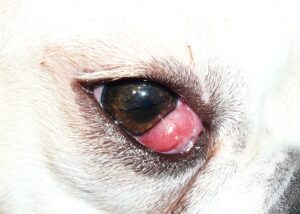Allergies can cause redness itching and discharge in your dog eyes. dry eyes syndrome can lead to redness irritation and discharge. inflammation of the conjunctive the membrane covering the white part of the eye can cause redness discharge and squinting. bacterial or viral infection can cause redness discharge and inflammation in the eyes. trauma to the eye can cause redness swelling and discharge.
Exposure to irritants like smoke dust or chemicals can cause redness and discomfort in the eyes. certain systemic diseases like diabetes. hypertension or autoimmune disorders can cause redness and other eye problems. if your dogs eye red it essential to consult a veterinarian to determine the underlying cause and appropriate treatment. your vet may perform a comprehensive eye exam take a complete medical history and conduct diagnostic tests to identify the cause.

Introduction
As a responsible dog owner it’s essential to be aware of your furry friend’s overall well-being including their eye health. dogs eyes can be prone to various issues and redness is a common indicator of an underlying problem. in this comprehensive guide we’ll delve into the possible cause of red eyes in dogs diagnostic methods treatment options and preventive measures. whether you’re a seasoned dog owner or a newcomer to the world of canine care this information will help you better understand and address your dog’s eye health needs. so let’s dive in and explore the world of dog eye care together from allergies to infection we’ll cover it all. by the end of this journey you’ll be equipped with the knowledge to identify potential eye issues in your dog and provide the best possible care for their precious peepers.
Are red eyes in dogs serious?
Red eyes are an indication of inflammation in one of the components that make up the dog’s eye. Depending on the cause, red eyes can mean anything from a minor issue to a serious—even life-threatening—medical condition. A dog with red eyes can also be at risk of significant vision loss or blindness.
How can I treat my dog’s eye infection at home?
Rinse your dog’s eye and eye area with simple saline solution, which can be purchased from a veterinarian or pharmacy, or made with a teaspoon of salt water in a cup of warm water. Carefully instill into the corner of your dog’s eye and dip a cotton ball in the solution and wipe away discharge from around the eye.
What can I give my dog for red eyes?
Topical medications are available in ointments or drops and may need to be applied up to three times daily for a week or two until signs resolve. Medications include antibiotics, steroids, pain relievers, dilators and artificial tears. In case of infection or trauma to the eye, oral antibiotics may be prescribed.
Can I give my dog eye drops?

Unfortunately, you would be mistaken to think that the same eye drops you use are suitable for dogs. You should not use human eye drops on dogs. If your dog is experiencing eye irritation, contact your vet and take them in to get an eye examination and possibly eye drops that are safe for dogs.
How can I help my dogs eye heal?
A simple injury may be treated with an e-collar to prevent your dog from rubbing the injured eye, and prescription antibiotics or drops. In some cases, if your dog is suffering from a severe eye issue, surgery may be required in order to repair your dog’s eye and preserve your pet’s eyesight.
Will my dog’s red eye go away?
In mild cases, you may see an improvement in your dog’s condition quite quickly, but frequent visits to the vet might be necessary to make sure the treatment is going to plan. More severe cases are less common, but could result in blindness, so it’s important to talk to a vet as soon as you notice any symptoms.
How to flush a dog’s eye?
If your dog is otherwise healthy, showing no other symptoms, and behaving normally in spite of the discharge, try to clean the eye and flush it with a sterile saline solution. Closely observe your dog and the eye condition in a day or two to see if there is any improvement.
Can you use human shampoo on dogs?
If you use a human shampoo on your pup, you may begin to alter your dog’s skin pH, making them prone to flaking, dryness, and infection. Human shampoo may also be harder to rinse out of your pup’s coat due to certain ingredients. Additionally, any remaining shampoo that isn’t washed out can irritate your dog’s skin.
Twice a day, wet a clean soft cloth with lukewarm water, squeeze out, and wipe away discharge from around the eye area. Carefully trim eye hair to prevent contamination from building up around the eyes and allow discharge to drain. Smooth hair around the eye away from the eye area.
Can a dog’s eye heal on its own?
Can a dog eye injury heal on its own? In some cases, yes. Certain injuries like corneal ulcers or scratches may heal on their own, but they still need to be assessed by a vet. If an infection develops, or there is foreign material like a grass seed still lodged within the eye, the consequences can be severe.
Can I use human eye wash on my dog?
It is not recommended to use over-the-counter (OTC) eye drops for humans on dogs without approval from a veterinarian. Dogs will not respond to most human eye drops well. Popular eyedrops for itchiness and redness often contain an ingredient called Tetrahydrozoline hydrochloride, which narrows blood vessels in the eye.
Inconclusion
Red eyes in dogs can be a sign of various underlying issues ranging from allergies and try eye syndrome to infections and systemic diseases. as a responsible dog owner it crucial to monitor your furry friend’s eye health and seek veterinary attention if you notice any unusual redness discharge or squinting. by understanding the potential cause of red eyes in dogs and taking proactive steps to maintain their eye health you can help ensure your dog comfort and well-being. remember early detection difference in preventing complications and promoting optimal eye health. in parallel, red eyes in human can also be a sign of various underlying issues including allergies infections and systemic diseases.



